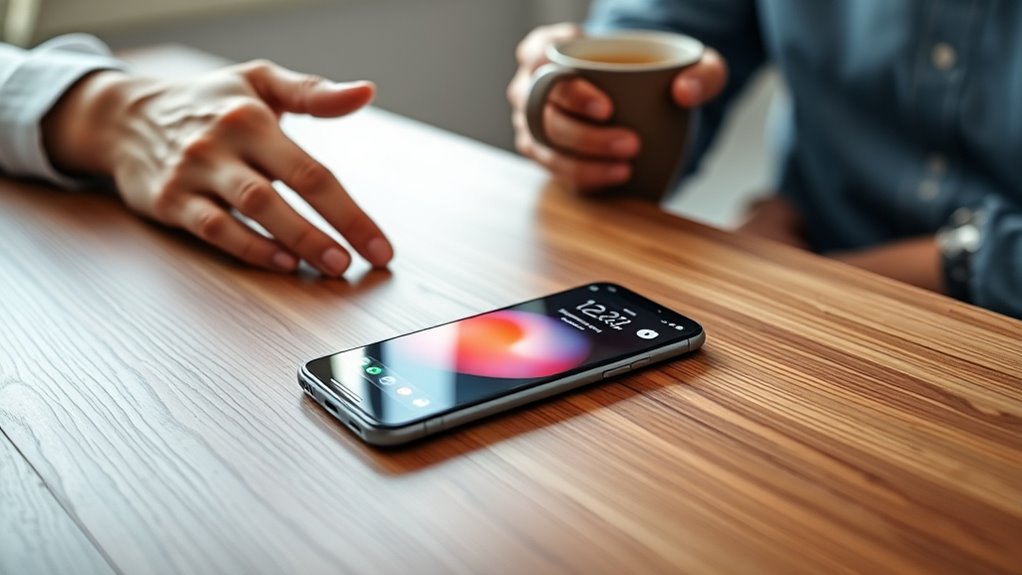To protect your love online, set clear social media boundaries that prioritize your mental health and personal privacy. Control who can see your posts, limit interactions that cause discomfort, and avoid sharing overly personal details. Communicate your limits with loved ones and stay mindful of emotional energy investments. Creating digital space that reflects your comfort levels fosters respect and safety in your relationships. Explore more ways to maintain healthy boundaries and strengthen your connections online.
Key Takeaways
- Establish clear boundaries on what personal information to share about your relationship online.
- Use privacy settings to control who can view your posts and limit access to trusted individuals.
- Communicate boundaries openly with your partner to ensure mutual understanding and respect.
- Avoid posting or engaging with content that may cause jealousy, insecurity, or misunderstandings.
- Regularly review and adjust your social media habits to maintain a healthy balance and protect your relationship.

In today’s digital age, setting boundaries on social media is essential for maintaining your mental health and personal privacy. As you navigate the online world, you might not realize how much your digital footprint can impact your well-being and relationships. Privacy concerns are at the forefront of these issues. Sharing too much personal information, even unintentionally, can expose you to risks like identity theft, harassment, or unwanted judgment. By establishing clear boundaries, you protect yourself from these dangers and foster a sense of security. It’s *vital* to decide what you’re comfortable sharing and stick to those limits, ensuring your online presence aligns with your comfort level.
Equally important are emotional boundaries. Social media can blur the lines between your real life and digital persona, leading to feelings of comparison, jealousy, or inadequacy. You might find yourself scrolling through curated posts that make you question your worth or relationships. To avoid this, set boundaries on how much emotional energy you invest in online interactions. For example, avoid engaging in heated debates or commenting on posts that upset you. Recognize when you’re feeling overwhelmed or anxious and step back. Remember, social media isn’t a reflection of reality; it’s a highlight reel, and protecting your emotional boundaries means not letting these idealized images affect your self-esteem. Incorporating AI-powered tools for managing your online interactions can further help in maintaining mental well-being and privacy.
Set emotional boundaries to protect your self-esteem from curated social media highlight reels.
Creating boundaries also involves managing your digital environment. Use privacy settings to control who can see your posts, and don’t hesitate to restrict or block users who make you uncomfortable. You have the right to curate your online space, just like your physical space. Limit your screen time if you notice it’s negatively impacting your mood or productivity, and consider designating social media-free zones or times. Communicate your boundaries with loved ones so they understand what you’re comfortable sharing or discussing online. This not only helps you maintain your privacy but also fosters healthier, more respectful relationships.
Ultimately, setting social media boundaries is about honoring your needs and safeguarding your mental health. You don’t have to share everything or respond to every comment. Your online presence should serve you, not drain you. By being intentional about what you post and how you engage, you’ll create a safer digital environment that respects your privacy and emotional well-being. Remember, boundaries aren’t about exclusion—they’re about self-care and empowerment in your digital life.
Frequently Asked Questions
How Do I Handle Social Media Jealousy in My Relationship?
When dealing with social media jealousy, recognize your jealousy triggers and communicate openly with your partner. You can try trust exercises together to build confidence. Avoid comparing yourself to others online, and set healthy boundaries that respect both your feelings. Remember, transparency helps reduce misunderstandings. By actively addressing these issues, you’ll strengthen your relationship and create a supportive environment where jealousy doesn’t take over.
What Are Signs My Partner Is Oversharing Online?
Did you know that 70% of people feel uncomfortable when their partner overshares online? If you notice your partner constantly sharing private details or engaging excessively with others, it could be a sign they’re crossing emotional boundaries and ignoring privacy concerns. You might see them focusing more on social media than your relationship or sharing personal info with strangers. These behaviors suggest they need to set healthier boundaries to protect your love online.
How Can I Rebuild Trust After a Social Media Breach?
To rebuild trust after a social media breach, start by addressing privacy concerns openly. Show your commitment to digital transparency by having honest conversations and setting clear boundaries. Consistently demonstrate reliability and respect, and avoid secrets that could cause doubt. By being transparent about your online activities and listening to your partner’s worries, you foster a secure environment where trust can gradually heal and grow stronger.
Should I Have Access to My Partner’S Social Media Accounts?
You might wonder if you should have access to your partner’s social media accounts, but consider privacy concerns and how it impacts trust development. While transparency can build trust, constant access could feel invasive and damage intimacy. Instead, focus on open communication about boundaries and expectations. Trust grows best when both partners feel respected and secure, so discuss what feels right for both of you without compromising each other’s privacy.
How Do Social Media Boundaries Differ Across Cultures?
Imagine social media boundaries as a garden fence; in some cultures, it’s a tall, private wall, emphasizing privacy expectations and personal space. Elsewhere, it’s a low hedge, encouraging openness and sharing. Cultural norms shape these fences, so what’s acceptable in one country may feel intrusive in another. Understanding and respecting these differences helps you navigate relationships across cultures, ensuring you honor each person’s privacy expectations and maintain healthy boundaries.
Conclusion
By setting clear social media boundaries, you protect your relationships and maintain trust online. Remember, your digital presence influences your love life just as much as your real-world actions. Are you ready to take control and create a healthier online environment for your relationship? Embrace these boundaries, communicate openly, and watch your love grow stronger—both on and offline. After all, isn’t your relationship worth the effort to keep it safe and respectful?









